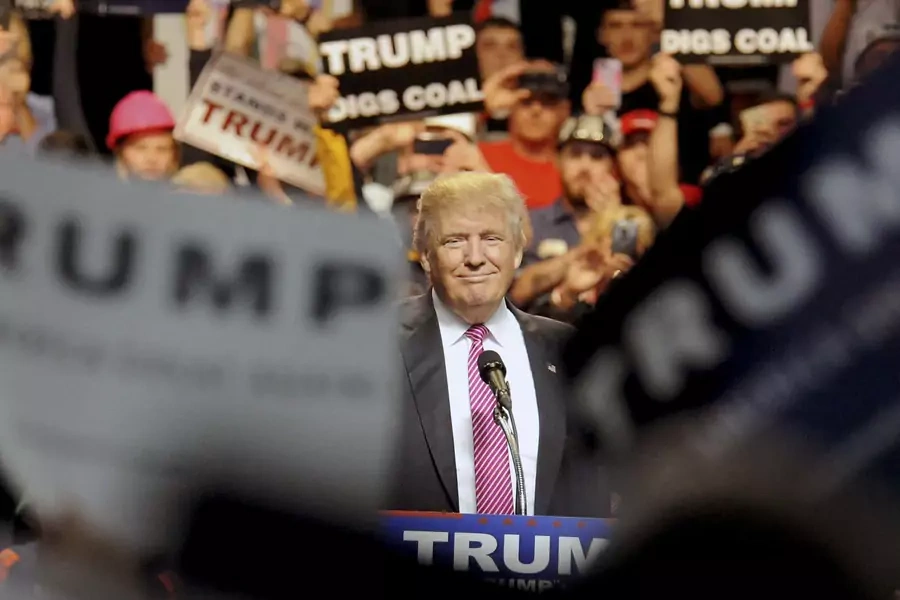Climate Change and U.S. Leadership Under President Trump

More on:
This guest post was written by Lindsay Iversen, associate director of climate and resources at the Council on Foreign Relations.
In the week since Donald Trump’s election, the energy and environment community has struggled to come to grips with candidate Trump’s positions on climate change and energy policy—positions that were not deeply explored during the campaign or raised by the moderators in any of the debates. If enacted, the policies Trump has proposed will reverberate beyond American borders, with potentially serious ramifications for U.S. leadership in other foreign policy realms.
President-Elect Trump has made clear that he does not believe climate change is a serious—or indeed even a real—phenomenon, calling it a “hoax,” a “very, very expensive form of tax,” and a “money-making industry.” His America-First Energy Plan reflects this belief. In it, he pledges to end U.S. participation in the Paris climate deal, cancel all U.S. payments to United Nations climate change programs, rescind the Clean Power Plan (President Barack Obama’s signature emissions reduction policy), shore up the U.S. coal industry, open federal lands to fossil fuel exploration, and back expansions of U.S. energy infrastructure, including authorizing the Keystone pipeline. Many of these policies were sufficiently important to the candidate to make their way into his plan for his first one hundred days in office.
The United States has been the central actor in international climate diplomacy for the past thirty years. Where it has exercised leadership—in securing consensus around the 1987 Montreal Protocol controlling ozone-destroying gases, or the 2015 Paris climate accord—it has been easier to galvanize international cooperation. Where the United States has hung back—failing to ratify the Kyoto agreement, for example—entire accords have collapsed.
It is far from clear that any other country could successfully assume the United States’ central position in climate policy. China, the world’s largest carbon emitter, has criticized Trump for threatening the Paris deal and signaled that it will seek a leadership role in international climate diplomacy. Next year’s Clean Energy and Mission Innovation Ministerials (Obama administration initiatives to convene major economies to ramp up investment in clean energy technologies) will take place in China. And its intensive efforts to develop and deploy affordable solar and wind technologies put China in a strong position to lead by example. China’s willingness to step up abroad is at least in part a reflection of the intense domestic political pressure driving Beijing to clean up its heavily polluted air and water at home. But it is also a reflection of China’s careful but increasingly overt drive to expand its influence and diplomatic power to a level commensurate with its economic heft.
It remains to be seen, however, how leadership in climate diplomacy would square with the other elements of China’s international agenda. Beijing has in recent years been criticized for its mercantilist relationships with natural resource suppliers in Africa, illegal island-building in the South China Sea, and territorial spats with several critical neighbors. It has also, Paris agreement aside, demonstrated that its main domestic goal remains economic growth and political stability; local officials have been caught falsifying air quality data in major Chinese cities to meet environmental standards without sacrificing economic performance. In other words, China may be willing to take the lead in international climate diplomacy, but that is no guarantee that other countries will follow.
Mitigating carbon emissions, meanwhile, is only half the puzzle. Countries are already grappling with the need to adapt to climate change, and with how to pay for it. Small island states such as Kiribati command attention because of their near-existential plight, but abnormal climate conditions have caused serious damage from the Arctic to Louisiana and beyond. The agenda for the 2016 UN climate summit in Marrakech included, among other things, setting up a financing mechanism to help poor countries adapt to the expected effects of climate change in the next few decades. Many were already skeptical that countries would be able to mobilize the $100 billion per year of public and private funding they pledged in Paris. It does not seem likely that cash-strapped Europe will be willing or able to take up the slack if the United States ends its climate financing, as Trump has promised to do, or have the diplomatic clout to induce China, India, Brazil, or other major emerging economies to contribute. If that is the case, the assistance will simply not materialize, leaving millions of impoverished people to face their fate alone.
Abdicating leadership in mitigation and adaptation, finally, will have ripple effects that extend far beyond international climate policy. If the United States demonstrates that it will not fulfill its commitments in one realm, countries will have little reason to trust its word in others—and indeed, Candidate Trump gave no indication that climate agreements would be the only ones under threat. The Iran nuclear deal, trade agreements, and even core military alliances could all be on the chopping block.
Trust and leadership are fragile things. National reputations built over the course of generations can be demolished astonishingly quickly through careless and destructive stewardship. Will Trump pull back from his campaign rhetoric and maintain faith with the United States’ international partners? Climate change policy may prove to be the canary in the coal mine.
More on:
 Online Store
Online Store